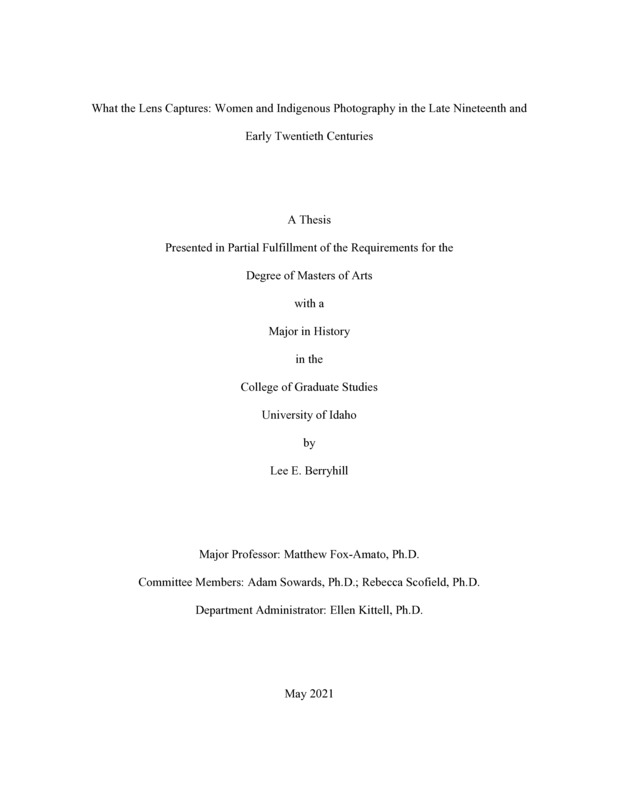What the Lens Captures: Women and Indigenous Photography in the Late Nineteenth and Early Twentieth Centuries
Berryhill, Lee. (2021-05). What the Lens Captures: Women and Indigenous Photography in the Late Nineteenth and Early Twentieth Centuries. Theses and Dissertations Collection, University of Idaho Library Digital Collections. https://www.lib.uidaho.edu/digital/etd/items/berryhill_idaho_0089n_12111.html
- Title:
- What the Lens Captures: Women and Indigenous Photography in the Late Nineteenth and Early Twentieth Centuries
- Author:
- Berryhill, Lee
- Date:
- 2021-05
- Program:
- History
- Subject Category:
- American history
- Abstract:
-
It is well known that by the turn of the century, male photographers, such as Edward S. Curtis were taking documentary photography of what they considered a vanishing race. However, this is only part of the story of Indigenous photography. White women also participated in photography: Some as a hobby and others professionally. Photography was not exclusive to Euro-Americans either, but a way in which Indigenous people photographed themselves and their communities. Far from disappearing, Indigenous people resiliently survived, and utilized photography in their own way. Rather than photographs illustrating a disappearing act, Indigenous photography depicts autonomy and strength. It was not all men either who took up a camera to capture Indigenous sitters. White women also played a role in the history of photography and Indigenous photographs. Even Indigenous women themselves took photographs and experimented with photography. This thesis offers an analysis of Indigenous photography taken by three women photographers of the late nineteenth and early twentieth centuries. In this study I investigate the way two white women portrayed and interacted with Indigenous communities through photography, and how an Indigenous woman utilized photography to capture her own Indigenous community. The primary sources of investigation are photographs taken in the 1890s and 1900s created by the three women photographers of Indigenous peoples, landscapes, buildings, and Euro-Americans in Idaho and a rural community of Cherokee in Oklahoma. By arguing that these photographs stand as evidence of Indigenous knowledge of and interaction with photography and women’s participation in photographing Indigenous peoples, I demonstrate that Indigenous photography by women and by Indigenous women are taken for reasons that differ from not only each other, but also their male contemporaries. This thesis is organized around three case studies of women photographers that took photographs of Indigenous peoples. Benedicte Wrensted, a white woman from Pocatello, Idaho who took some of the only known nineteenth century photographs of Shoshone-Bannock, was a professional with her own studio. She illustrates a white woman making photography her career, and photographing Indigenous people, because they were her clients. E. Jane Gay, another white woman who photographed the Nez Perce while the Dawes Allotment Act (1877) was being implemented with an agenda toward assimilation policy. Finally, Jennie Ross Cobb, a Cherokee woman from Oklahoma who took amateur photographs of her Cherokee community with no government agenda or paying clients to influence her photography. Their photographs allow for a look at how women photographers both white and Indigenous participated in Indigenous photography and how their photography connects to the larger scope of scholarship within visual history.
- Description:
- masters, M.A., History -- University of Idaho - College of Graduate Studies, 2021-05
- Major Professor:
- Fox-Amato, Matthew
- Committee:
- Sowards, Adam ; Scofield, Rebecca
- Defense Date:
- 2021-05
- Identifier:
- Berryhill_idaho_0089N_12111
- Type:
- Text
- Format Original:
- Format:
- application/pdf
- Rights:
- In Copyright - Educational Use Permitted. For more information, please contact University of Idaho Library Special Collections and Archives Department at libspec@uidaho.edu.
- Standardized Rights:
- http://rightsstatements.org/vocab/InC-EDU/1.0/

